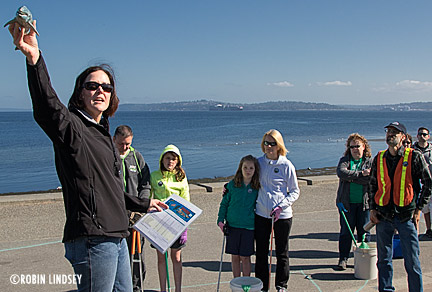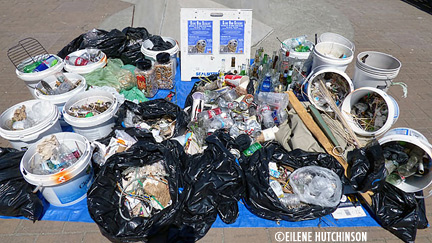Volunteers kick trash's butt - beach cleanup a resounding success
Jun/14/15 08:21 AM

After a short welcoming from Seal Sitters, a heartfelt thank you was extended to PAWS Wildlife volunteers and staff who were in attendance. PAWS is a valued partner of the Marine Mammal Stranding Network as a rehab resource for harbor seal pups. Among the many West Seattle seal pups rehabilitated by PAWS was emaciated Sandy - only to die entangled in derelict fishing line after being returned to health and to the wild. Seal Sitters holds these annual cleanups in honor of Sandy and the Arroyos gray whale.
Peggy Foreman (shown above), education specialist for NOAA Fisheries, spoke about the impact of human trash on gray whales. Grays forage by scooping up large mouthfuls of sediment and water from the sea bottom and sieve small prey and crustaceans (such as tiny ghost shrimp) through their baleen. Sadly, when the ocean floor is littered with human trash, that is sucked in as well. Peggy spoke about the young gray whale who died on the beach in the Arroyos neighborhood in April of 2010. A necropsy of the thin juvenile showed virtually no food in the whale’s stomach, however, a disturbing amount of trash - plastic bags, funnel, golf ball, rope, half a pair of adult sweatpants. Peggy spread out a tarp with a representation of the trash found inside this whale; it provided a striking educational tool used to interact with the public.
Seattle Aquarium Beach Naturalist Daoud Miller pointed out the importance of making sure invertebrates were not using a piece of debris as a home before removing it from the beach. He also reminded participants that moon snail egg casings which look like trash are indeed NOT. Daoud was available throughout the morning, as was Amy Webster of PAWS, to answer questions from volunteers.

They returned lugging over 9,000 toxic butts and a sizable mass of trash (shown at right), all in less than two hours. People shouted out kudos from their cars as they drove by. Walkers strolling by the Statue Plaza were astonished at the pile that was accumulating and were so thankful for the volunteers’ great work. Some of them signed up on the spot to help out, too. It was amazing how much dangerous trash was collected in such a short time.
Seal Sitters thanks Amy, Daoud and Peggy for making our cleanup so informative. Huge thanks to all of the passionate people who made the beach a much safer home for marine life!
Yesterday afternoon, 42 people attended a Seal Sitters new volunteer training session. All in all, it was a very successful Saturday for wildlife and advocates.







